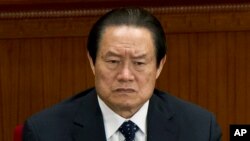BEIJING —
The Communist Party's anti-graft body in China says its work was effective in 2013, and led to the investigation and punishment of more than 182,000 party officials.
Last year's crackdown was more intense than the year before, and targeted a number of high level officials from the provincial and central government levels, as well as top executives within China's state-owned firms, according to the CPC Central Commission for Discipline Inspection's 2013 review.
The review, issued Friday, is a showcase for China's President Xi Jinping, who has pledged to rid the party of corruption regardless of rank or political clout.
Joseph Cheng, professor of political science at City University of Hong Kong, says that the party has worked hard to demonstrate its determination to reduce graft.
“One of the most important features of that is to indicate that no matter how high you are, you are still subject to sanctions and prosecution,” says Cheng.
Huang Shuxian, deputy head of the party's watchdog commission, said that last year, the party investigated 31 high level officials and eight of them are now facing legal prosecution. One of the eight is Liu Tienan, a top economic official whose questionable financial deals were first uncovered by a journalist at a prominent Chinese magazine.
Former provincial deputy head Ni Fake, another name on the commission's list, accepted hundreds of thousands of dollars in return for mining rights and land. According to party investigators, some of the bribes came in the form of expensive jade carvings, which Ni liked to collect and showcase in a private gallery.
Joseph Cheng says that official pronouncements about targeting both “tigers and flies,” high and low level corruption, leaves people wondering how far Xi Jinping's administration is willing to go.
“All eyes are turning actually to the potential prosecution of Zhou Yongkang,” says Cheng.
Zhou is a former member of the Politburo Standing Committee in charge of the police, courts and intelligence services. After his retirement last year, speculations surfaced that he too might be a target of Xi Jinping's anti-graft efforts.
A number of Zhou's aids and political allies have been put under investigation since, and Hong Kong media say Zhou himself might be under house arrest.
Cheng says that an indictment against the former security bureau tsar would be exceptional given the high rank Zhou once had, but might also serve President Xi a different purpose.
“There is a suspicion that the struggle against Zhou Yongkang is also an attempt to limit the immense power in the hands of the public security apparatus, which is probably one of the goals in the hands of Xi Jinping who wants to concentrate power in his hands,” says Cheng.
After taking office last March, Xi has been consolidating power by taking a number of powerful seats, including the chairmanship of the “leading group for overall reform,” in charge of economic plans and domestic policies.
President Xi is also general-secretary of the Communist Party and chief of the Central Military Commission.
Last year's crackdown was more intense than the year before, and targeted a number of high level officials from the provincial and central government levels, as well as top executives within China's state-owned firms, according to the CPC Central Commission for Discipline Inspection's 2013 review.
The review, issued Friday, is a showcase for China's President Xi Jinping, who has pledged to rid the party of corruption regardless of rank or political clout.
Joseph Cheng, professor of political science at City University of Hong Kong, says that the party has worked hard to demonstrate its determination to reduce graft.
“One of the most important features of that is to indicate that no matter how high you are, you are still subject to sanctions and prosecution,” says Cheng.
Huang Shuxian, deputy head of the party's watchdog commission, said that last year, the party investigated 31 high level officials and eight of them are now facing legal prosecution. One of the eight is Liu Tienan, a top economic official whose questionable financial deals were first uncovered by a journalist at a prominent Chinese magazine.
Former provincial deputy head Ni Fake, another name on the commission's list, accepted hundreds of thousands of dollars in return for mining rights and land. According to party investigators, some of the bribes came in the form of expensive jade carvings, which Ni liked to collect and showcase in a private gallery.
Joseph Cheng says that official pronouncements about targeting both “tigers and flies,” high and low level corruption, leaves people wondering how far Xi Jinping's administration is willing to go.
“All eyes are turning actually to the potential prosecution of Zhou Yongkang,” says Cheng.
Zhou is a former member of the Politburo Standing Committee in charge of the police, courts and intelligence services. After his retirement last year, speculations surfaced that he too might be a target of Xi Jinping's anti-graft efforts.
A number of Zhou's aids and political allies have been put under investigation since, and Hong Kong media say Zhou himself might be under house arrest.
Cheng says that an indictment against the former security bureau tsar would be exceptional given the high rank Zhou once had, but might also serve President Xi a different purpose.
“There is a suspicion that the struggle against Zhou Yongkang is also an attempt to limit the immense power in the hands of the public security apparatus, which is probably one of the goals in the hands of Xi Jinping who wants to concentrate power in his hands,” says Cheng.
After taking office last March, Xi has been consolidating power by taking a number of powerful seats, including the chairmanship of the “leading group for overall reform,” in charge of economic plans and domestic policies.
President Xi is also general-secretary of the Communist Party and chief of the Central Military Commission.






